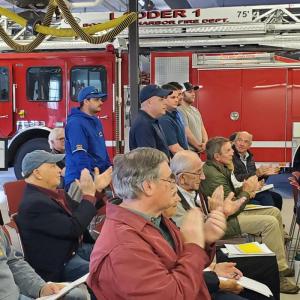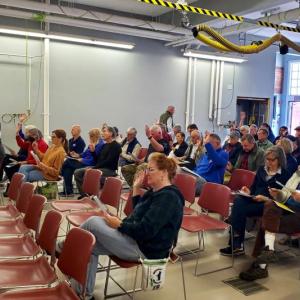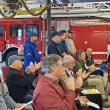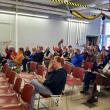Boothbay Harbor rejects controversial housing amendment
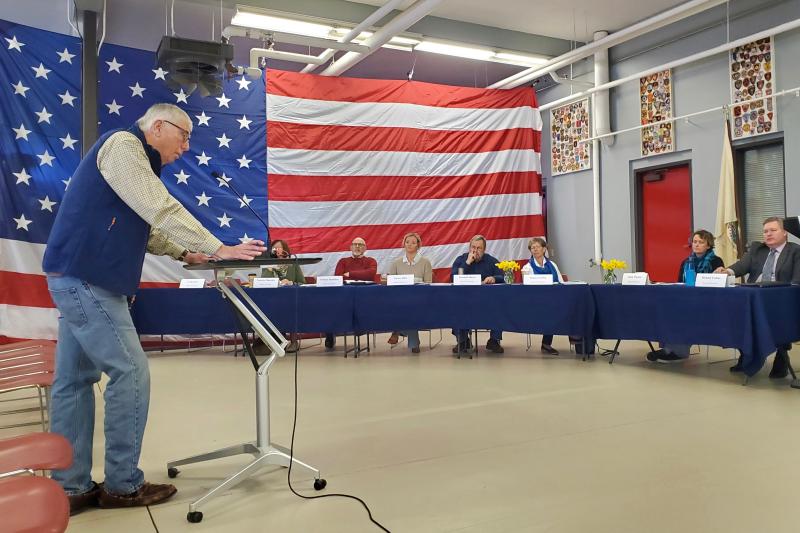 Merritt Blakeslee speaks to Boothbay Harbor town representatives, staff and voters during the town meeting May 6. FRITZ FREUDENBERGER/Boothbay Register
Merritt Blakeslee speaks to Boothbay Harbor town representatives, staff and voters during the town meeting May 6. FRITZ FREUDENBERGER/Boothbay Register
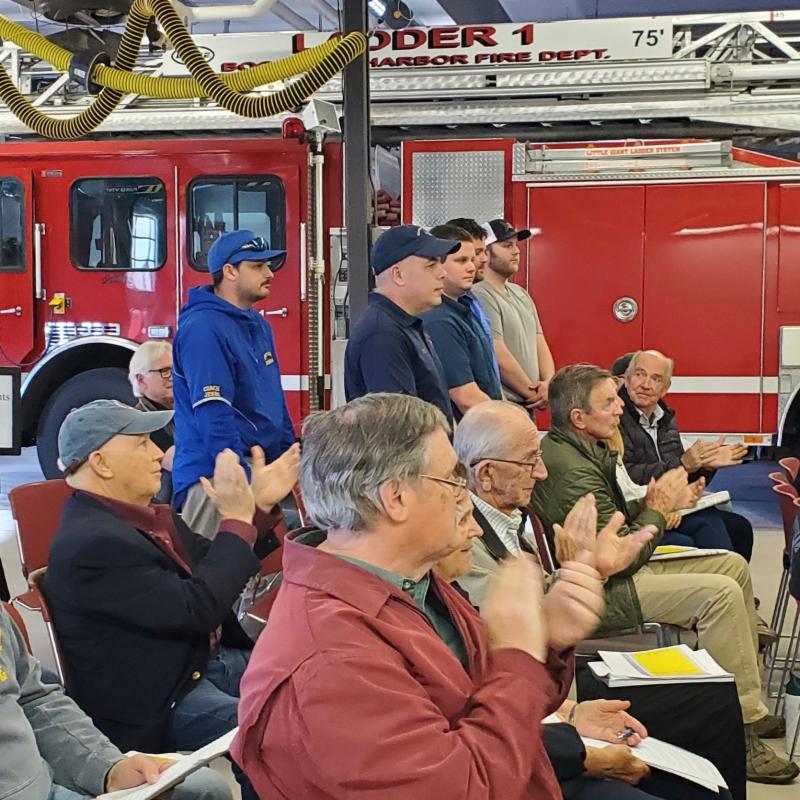 Members of Boothbay Harbor Fire Department receive applause after winning the Spirit of America award. FRITZ FREUDENBERGER/Boothbay Register
Members of Boothbay Harbor Fire Department receive applause after winning the Spirit of America award. FRITZ FREUDENBERGER/Boothbay Register
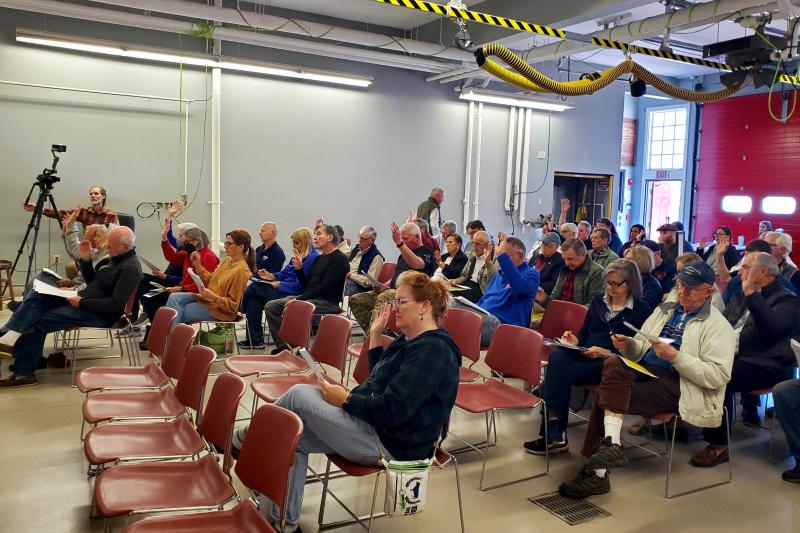 Boothbay Harbor residents vote during town meeting May 6. FRITZ FREUDENBERGER/Boothbay Register
Boothbay Harbor residents vote during town meeting May 6. FRITZ FREUDENBERGER/Boothbay Register
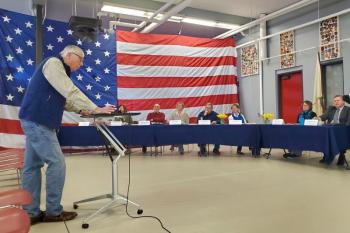 Merritt Blakeslee speaks to Boothbay Harbor town representatives, staff and voters during the town meeting May 6. FRITZ FREUDENBERGER/Boothbay Register
Merritt Blakeslee speaks to Boothbay Harbor town representatives, staff and voters during the town meeting May 6. FRITZ FREUDENBERGER/Boothbay Register
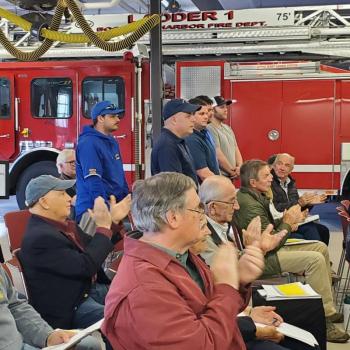 Members of Boothbay Harbor Fire Department receive applause after winning the Spirit of America award. FRITZ FREUDENBERGER/Boothbay Register
Members of Boothbay Harbor Fire Department receive applause after winning the Spirit of America award. FRITZ FREUDENBERGER/Boothbay Register
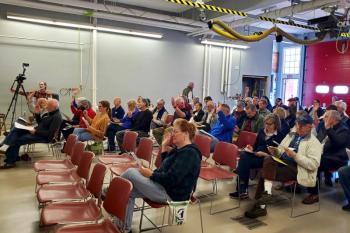 Boothbay Harbor residents vote during town meeting May 6. FRITZ FREUDENBERGER/Boothbay Register
Boothbay Harbor residents vote during town meeting May 6. FRITZ FREUDENBERGER/Boothbay Register
Boothbay Harbor failed to pass an article tied to a controversial state law aimed at tackling Maine’s housing crisis. At the annual town meeting May 6 at the fire house, the other 21 articles passed, including the proposed $4,289,558 million town budget for 2024.
The budget increased almost 7.5%, or $298,000 from last year’s, largely due to the increased cost of labor, services and goods, according to Town Manager Julia Latter. Latter said the town “remains in excellent fiscal shape.”
Residents paid the most attention to Article 22, which was tied to Maine law LD 2003. Enacted in 2022, LD 2003 mandates certain actions for local governments around housing and requires all Maine municipalities to incorporate the law into their ordinances by July 1.
“It was a contentious and difficult-to-understand piece of legislation,” said Selectmen’s Chair Michael Tomko. “I expected there would be quite a bit of debate ... I worry about putting the town at risk by not having this approved.”
However, voters raised concern the ADUs and other parts of the amendment would not be enough to solve the town’s housing problems.
Some said small ADUs would not be large enough to attract workers. Others said the language does not prevent the additional living structures from being used as short-term rentals or at unaffordable rates.
“If we vote for this law today, I plan to vote no. Not because I don’t like affordable housing, but I think the bill is not well worded. I think there are lots of issues. All plans don’t fit Boothbay Harbor and also Portland, Maine. This plan is just too universal,” said Jon Dunsford of west Boothbay Harbor. His comment received applause.
Voters also expressed concern the state is overreaching. Planning Board Chair Tom Churchill spoke on his own behalf and said the bill bypasses local ordinances. Churchill was not alone in his opinion.
“I have an atavistic rejection of this top-down approach from the state of Maine,” said resident John O'Connell. “One size does not fit all and, if there is no real penalty to hold off, I don't have a problem with it ... I just see it putting us into absolute turmoil and we'd be struggling with this and have the state looking over our shoulders for years.”
Article 20 passed, which adjusts the zoning of Boothbay Harbor Memorial Library, Bath Savings Bank and a nearby town parking lot to be included in zoning with neighboring downtown properties. The article also adjusts parking standards in the district so that additional parking demands are not required.
Article 21 also passed, clarifying that the role of the Board of Appeals is to review planning board and code enforcement officer decisions based on the record of evidence presented at the time of the original decision.
In other action, the fire department received the Spirit of America award for its service.
“It's hard to imagine a more selfless and devoted awardee as our fire department,” said Tomko as he presented the award. “The fire department has always been a cornerstone of this community.”


